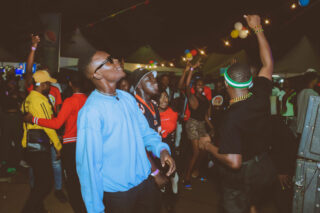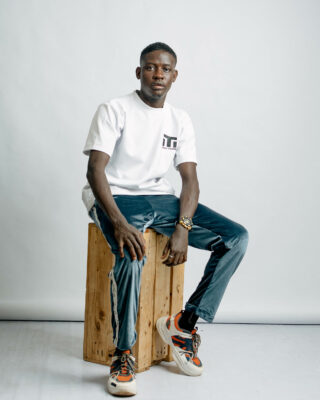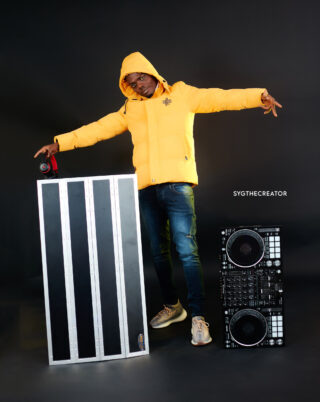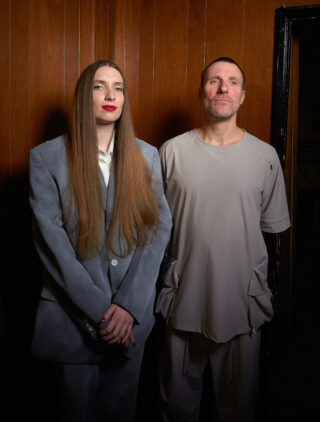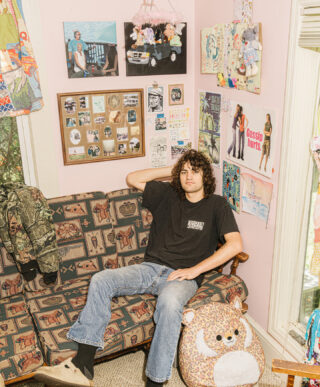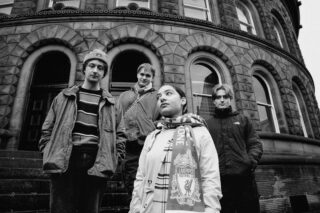The rapid creativity of cruise has been the biggest hurdle for MOVES, as they release the first international compilation of cruise beats as a four-part EP series. Nevertheless, documenting the early days of this movement has been a rewarding task.
“We’ve signed some stuff that’s going to be coming out six months after you’ve signed it, which is crazy when things are moving so quickly,” McQuaid says.
That’s made even more of an issue given the EPs will be releasing on vinyl during a time where pressing plants are badly falling behind on orders. The incongruity of capturing such an intentionally disposable and digital sound on record was too good to pass up on, though.
“We wanted to print on vinyl because we wanted to do this kind of ludicrous thing of taking this ‘throwaway’ sound and putting it on a record. Vinyl is a ridiculous format – it’s an antiquated luxury format, which I quite like. But I liked the wrongheadedness of taking this complete throwaway thing, which in some cases it’s just mp3s without any real project files. ”
Cruise is not yet in its final form, and there’s no way of knowing where it’ll end up. “I’ve no idea where this thing will be in six months’ time,” says McQuaid. “It’ll probably be growing and spreading. I’m also aware of the distorting lense of bringing foreign money into stuff. It’s like quantum physics; when you measure something you change its position.
“I don’t want our presence to have a distorting effect in a negative sense. I want to be able to support people to grow in the way they would have done naturally, and like the best scenes, they tend to grow outside of the limelight to get to a solid place before they blow. I know it’ll change. I think it’ll grow first before you see the changes, but it’ll be driven by what people start dancing to.”
“I see it as a new thing,” says DJ Cora. “I can say I’m the first of the DJs that started cruise, I see it as something that people hadn’t really indulged in when I started. Once I started it, I saw a lot of attention, a lot of opportunities. That was when I became conscious of what I was doing.”
In the beginning, McQuaid and MOVES reached out directly to artists on social media. Some of the download links even had phone numbers attached. That led him to artists like Slimfit. Next was DJ Cora’s manager. Some were harder to find than others, like DJ YK, who has since become one of the most prominent figures within the scene.
Soon, he was building relationships via WhatsApp, and setting up cross-continent meetings with producers and their managers. This unorthodox approach wasn’t without its problems.
“There’s a lot of culture clash. None of these people have had any kind of experience of mainstream DSPs [streaming platforms like Spotify and Apple Music]. There’s a lot of distrust. There’s a lot of people thinking that you’re scamming them. Sometimes it’s good, because you get challenged on a lot of basic stuff that you just take as read. If someone says ‘Why is it like that?’, you have to think, ‘Well, why is it like that?’ If it doesn’t make sense and they want to change it, you think, ‘You’re right, I’m wrong, let’s change it.’”
This fluid, non-traditional approach mirrors how exciting it is to follow the music itself. The artists and the label have been keen to use the immediacy of the platforms they work on to their advantage, spotting gaps that antiquated parts of our industry simply don’t see.
“The technology has enabled us to speak and engage with so much more immediacy. I can phone someone up at any time – or more realistically they can phone me day or night, which is what often happens. We’ve got tunes now where people have been WhatsApping demos and slapping a verse on in one place, and sending it onto the next place. For me, there’s a new route that completely circumnavigates all the traditional structures of power and control that are largely in a very small group of companies. We’re finding ways to work around that and hopefully give artists better deals using the tools that we have.”
Here we can see that cruise is part of a bigger conversation, in which artists on the outside aren’t let in until it’s overwhelmingly obvious that their sound is part of the current landscape. At that point, they’re exploited, their sound diluted, and the money often wasted.
“Everything is still done in the same way.” McQuaid says. “It’s unconscionable that a label can take an 85% cut of someone’s money. That only made sense if you were making physical products and you controlled all the distribution systems. How the hell was someone going to get a record in Taiwan from Hull without a huge machine behind it? Now, I can do that with a Tunecore account. What the majors have done is started ramping up video budgets to justify this huge swinging amount of royalty rate, to tell artists who’ve got to be on this level which makes it beyond the reach of most people. That’s bullshit. You don’t need that.”
In Lagos, that process has resulted in a divided culture, where those without lavish lifestyles on the Island (aka Victoria Island, an exclusive, affluent part of Lagos) don’t have music that’s about their own lives. After the Afrobeats explosion around artists like Burna Boy and Wizkid, huge production budgets became a selling point for many artists, promoting an unattainable lifestyle that alienated some of its listeners. Cruise is in some ways a response to that. Like the familiar narrative of the original punk scene growing out of a desire to subvert a bloated and expensive prog-rock market, cruise has developed out of necessity and community spirit.
“It’s created a void where this music has come in to fill,” says McQuaid. “It’s cheap. It’s very DIY. Anyone can make it with a shit laptop and a rip of FruityLoops. It’s found a gap where people actually need something that reflects their lives, as opposed to the aspiration of the mega-rich. There was a big gap where the scene was providing what people needed.”
The filling of that gap can be seen in real time at New Afrika Shrine, a venue co-managed by Femi Kuti. Unlike many other club venues that cater to high earners, the Shrine has an open door policy that makes it accessible to working-class people who are frequently priced out of other live music venues. At the club’s afterparties, venue goers started requesting sped-up amapiano, and eventually, original freebeat tracks. That sound began to bleed into venues elsewhere. Now, a rural and unpretentious street sound is beginning to take over Lagos.
This has also led to smash crossovers, like Portable’s ‘ZaZoo Zehh’, produced by P Prime. Prime made the smart move to reign in some of the wilder tendencies of the sound, sculpting into a more accessible form, and the results have pushed cruise into the mainstream. Hybrid forms of cruise seem to be popping up everywhere.




